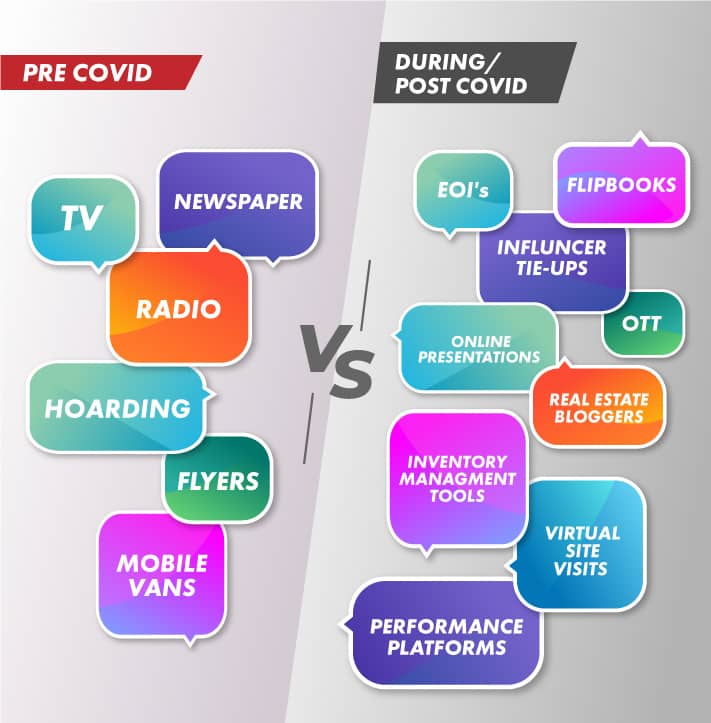The Indian real estate sector is one of the most lucrative sectors in India. It has been growing steadily over the last few years and is expected to grow even more in the coming years. The sector has seen a boom in recent times owing to factors like increased disposable incomes, low interest rates, and high population density which, in turn, translates to more demand.
The first wave of COVID-19 had a profound impact on the Indian real estate sector as things came to a complete standstill with the country-wide lockdown. But the industry has shown great resilience and come a long way from then by adapting to this ‘new normal’. In this time, the complete journey of a homebuyer has been altered. While some see this as a challenge, most developers have been quick to realize the opportunity this provides.

Impact of COVID-19 on Digital Adoption in Real Estate
Digital adoption is rising rapidly in India and this has impacted every sector in the country in one way or the other. With respect to the real estate industry, data shows that over the past few years, most homebuyers, as a first step, go to digital platforms to start their search for a new home. This is why Digital has become an important prerequisite for all real estate developers and builders. Pre-COVID, the real estate industry had already started on its path of digital upgradation; the pandemic put it on the fast track.
Real estate has been long criticized for its rigid processes and the slow pace at which it adopts new developments and trends. Due to its specificities, the shift to digital has been longer and more complicated than for other sectors.
The pandemic resulted in multiple lockdowns and an increased hesitancy amongst buyers to physically step out and visit properties. Property developers were left with no choice but to quickly adopt a new and technology-driven business model. Tech tools like virtual walkthroughs, 3-D mapping, drone surveys were deployed years ago, but only on select projects, dominantly luxury real estate.
Suddenly, every project had VR/3D enabled site visits, chatbot-assisted inquiries to online bookings and digital transactions. A plethora of tech-enabled solutions suddenly became available to homebuyers across every segment of the market.

Addressing the Buyer’s Pain Points Through Digital
Digital adoption that was expected to be seen in the sector in 3-5 years suddenly happened in less than a year. This new Digital-First approach was initially seen only as an immediate bailout in a period of uncertainty. Now, the challenge facing developers is building a sustainable long term business model by integrating these new digital assets.
It has become evident that consumers prefer digital and remote human engagement over in-person interactions - a sentiment that has progressively deepened even after the lockdown restrictions have been lifted.
Digital marketing is one of the most important aspects of any business today and has become a consistent part of every company’s marketing strategy. With digital adoption in the sector increasing by leaps and bounds, the importance of digital marketing in any real estate developer’s strategy takes critical importance.
With homebuyers taking to digital platforms and real estate aggregators building innovative digital assets, the only remaining step is to connect the supply and demand. Digital marketing is that very bridge that allows real estate developers to easily reach and bring homebuyers onto the newly created digital assets.
Catering More Effectively to NRIs
While digital marketing has always offered the capability to reach users in any part of the world, the real estate industry has always faced a challenge while marketing to NRIs due to the hesitancy of buyers investing without seeing the property. But with the arrival of Virtual site visits, NRI investments are bound to rise. Yet again, opening up another marketing opportunity for builders.
Digital marketing provides a level of analytical information that is unheard of in traditional marketing. With the complete homebuyer journey becoming digital, it provides the opportunity for developers to strategically layer their marketing efforts to move interested buyers systematically down the sales funnel.
In recent times, developers have adopted a 360-degree digital real estate lifecycle where a potential buyer has the ability to virtually choose the exact unit in a multi-floor tower through advanced image processing.
COVID has taught developers to adopt new ways of marketing. Over the past 2 years, we have witnessed a shift in budgets from mainstream platforms like TV, newspaper, FM to Digital, OTT etc. Developers have even transitioned to online-only project launches, virtual site visits, Expression of interest, etc.
From 2019 to Now
When the nation came to a standstill in March 2019, we thought several industries would fail. The first few months was the biggest lull the industry has witnessed in years. But it also gave potential homebuyers the time to understand their needs and the importance of bigger and better homes.
Those who were looking for 2BHK now wanted 3 BHK and so on. The developers have also adapted to the market trends by creating WFH-friendly homes. Come 2020, the industry witnessed the biggest surge in demand for homes across all metropolitan cities in India. This surge was also, in a way, prompted by the government in a way to clear ready-to-occupy inventories. The government provided special subsidies for budget properties, waived off GST for ready-to-occupy homes and also slashed the interest rates for home loans. All these benefits coupled with the homebuyers’ urge to upgrade to bigger homes created the upward curve that the developers are riding on now.
COVID-19 posed a difficult challenge wherein the other side of the coin was a key opportunity i.e. for the real estate industry to gear up for the winds of change by going digital which, in turn, bridged the gap between the developers and potential home buyers. This, invariably, is now the ‘new normal’ of real estate.
Enthusiastic business head in the southern region with a demonstrated history of working in Marketing, Sales, Tech & Servicing for more than a decade now helps to bring new businesses and set up digital growth strategies & digital transformation for the brands in the southern region.






Leave a Comment